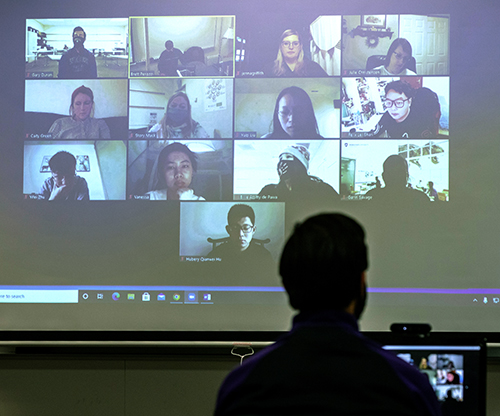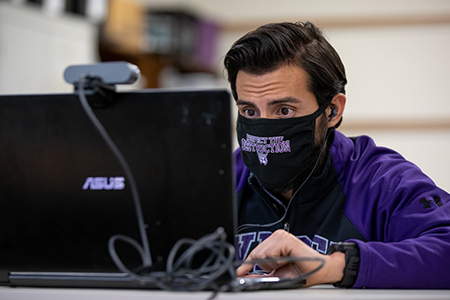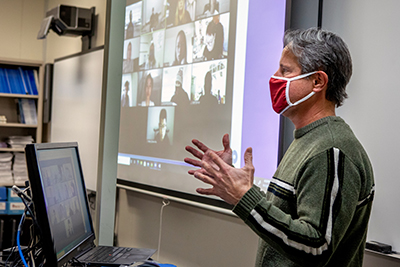State Department Ranks WSU Among Top 20 Master’s Universities in U.S. for Study Abroad Participation
OGDEN, Utah – For the second year running, Weber State University has placed in the top 20 master’s level universities in the nation for the number of students who study abroad in short-term programs.
This ranking comes from the 2020 Open Doors Report, which is sponsored and funded by the U.S. Department of State and produced by the Institute of International Education. Released this morning, Nov. 16, the 2020 report ranks universities for study abroad participation during the 2018-19 academic year, prior to the beginning of the COVID-19 pandemic, which led to the widespread postponement and cancellation of study abroad programs by U.S. universities, as recommended by the CDC.
 “This is a very unique year,” said Yimin Wang, senior international officer of Weber State and assistant professor of education in the Jerry & Vickie Moyes College of Education. “While international travel is challenging, we are collaborating with our international partner universities to provide virtual opportunities for our students to engage with different cultures and experiences while being on campus.”
“This is a very unique year,” said Yimin Wang, senior international officer of Weber State and assistant professor of education in the Jerry & Vickie Moyes College of Education. “While international travel is challenging, we are collaborating with our international partner universities to provide virtual opportunities for our students to engage with different cultures and experiences while being on campus.”
In 2018-19, 351 Weber State students participated in short-term study abroad programs, including summer programs and programs lasting eight weeks or less, a category with the highest rate of participation nationally. With this number of short-term study abroad students, Weber State ranks #17 among master’s level universities in the 2020 Open Doors Report, retaining its rank from 2019. That report marked the first time a master’s-level university in Utah appeared in the report’s top 20 in any of the three program categories, which include short-term, mid-length and long-term programs. Southern Utah University also appeared in the top 20 for short-term programs that year.
The COVID-19 pandemic might have put study abroad programs on hold, but that hasn’t kept the university from laying the groundwork for future study abroad programs and other international collaborations.
Weber State plans to hold study abroad programs in summer 2021 if they’re permitted by the CDC and the related university policies, Wang said. Virtual study abroad fairs were held in October and early November, acquainting students with their study abroad options for next summer. As the pandemic continues, Weber State will update contingency plans to ensure students remain on track towards graduation if the pandemic leads to future cancellations, Wang said.
International education — including U.S. students studying abroad and international students studying in the U.S. — has faced unprecedented challenges during the COVID-19 pandemic. At the same time, its necessity has become more apparent, as countries around the world have needed to cooperate on public health measures and collaborate to develop a vaccine that will bring an end to the global crisis.
Understanding the importance of international education, Weber State has looked for creative ways to continue to offer international experiences during the pandemic, including a new collaboration with Shanghai Normal University Tianhua College, which allows students at the college to enroll in Weber State’s Master of Education program.
 The program originally planned to bring Shanghai students to Weber State campus in fall 2020 and send Weber State faculty to Shanghai the summer prior to teach English language classes and a few foundational Master of Education courses. However, when the pandemic struck in March, Weber State faculty and administrators quickly pivoted to offer the summer and fall coursework virtually, allowing students from Shanghai to make progress toward their degrees while staying in China.
The program originally planned to bring Shanghai students to Weber State campus in fall 2020 and send Weber State faculty to Shanghai the summer prior to teach English language classes and a few foundational Master of Education courses. However, when the pandemic struck in March, Weber State faculty and administrators quickly pivoted to offer the summer and fall coursework virtually, allowing students from Shanghai to make progress toward their degrees while staying in China.
The decision to offer the courses virtually was potentially life-altering for QianWei “Hubery” Hu, a Weber State international student in the Master of Education program who lives in Shanghai.
If Hu hadn’t been offered the option to pursue the degree virtually, he may have needed to switch to a different program in China, prolonging his completion of a graduate degree by two or three years, he said, and delaying his entry into full-time work. He would not be able to start another program immediately because he would need to go through the application process for programs in China, which can be intensive, he said. In addition, Weber State and Tianhua College have collaborated to provide an accelerated track, which allows Shanghai students to complete their degree in about one year, while programs in China last two or three years, Hu said.
“To me, the Weber State University master’s program is a new chance to change my life and choose my new career,” Hu said. “Because of the pandemic, finding a good job is difficult in China, and I know it’s the same situation in the United States.”
Besides the opportunity to complete a degree quickly, Hu wanted to gain international experience through a U.S. graduate program, he said. His goal after graduation is to launch a business that offers tutoring and other educational services, part of a growing industry in China, and he thinks a U.S. program is good preparation for this career path, though a graduate degree is not required.
Beyond preparing for his profession, though, Hu wanted to learn about the U.S. education system and interact with students and professors from another country, which he considers a valuable experience regardless of his career plans, he said. His only regret is that he wasn’t able to do this in person.
 “If we could go to the United States, I believe we would make a lot of new friends, have more communication, maybe talk after class or during breaks, and share our experiences about our lives, not only the academic knowledge,” Hu said.
“If we could go to the United States, I believe we would make a lot of new friends, have more communication, maybe talk after class or during breaks, and share our experiences about our lives, not only the academic knowledge,” Hu said.
One of Hu’s classmates, Billie Atsitty de Paiva, agrees that studying with students from other cultures enriches higher education in concrete and intangible ways. In addition to taking graduate coursework, she’s also a student advisor and program specialist with Weber State’s International Student and Scholar Center, where she guides international students through their education at Weber State.
“I love hearing from the Chinese students in our class. I love hearing their perspectives,” Atsitty de Paiva said.
A member of the Navajo Nation, Atsitty de Paiva said that she’s learned from elders in her culture and other Native American tribes that “a good leader makes sure that they get everybody’s different perspectives,” she said.
Because of this, “any type of cultural exchange is something I hold dear to me,” she said. “Having these international relationships will not only help international students, but also make us stronger as a nation because it’s not smart to have enemies instead of friends. I really hope that once this pandemic has run its course, we can focus more on international exchange, and even if the pandemic continues, having these very unique ways of still interacting with international students will make us stronger as a people.”
The Open Doors Report is released each year in mid November to kick off International Education Week, a joint initiative of the U.S. Department of State and U.S. Department of Education. This year, International Education Week will run Nov. 16-20, and Weber State will host several events related to international education, with more information available at https://www.weber.edu/issc/internationaleducationweek.html.
For more news about Weber State University, visit weber.edu/wsutoday.
For photos, click on this link.
Megan Olsen, Office of Marketing & Communications
801-626-7948 • meganolsen9@weber.edu- Contact:
Yimin Wang, senior international officer of Weber State and assistant professor of education
734-972-6017 • yiminwang@weber.eduBillie Attsity de Paiva, student in Master of Education program, student advisor and program specialist at International Student and Scholar Center
billiepaiva@weber.eduBrett Perozzi, vice president of student affairs and instructor in Weber State’s Master of Education program
801-626-6008 • brettperozzi@weber.edu